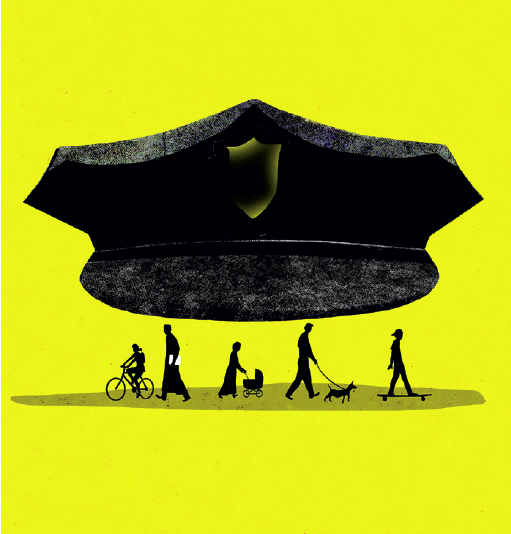Faculty Educate Police to Respond to Mental Health Crises
May 05, 2022 Mary Therese Phelan
Mental Health First Aid for Public Safety is an eight-hour course for police, first responders, corrections officers, and other public safety personnel nationwide.
University of Maryland, Baltimore Police Department (UMBPD) officers and police communications operators (PCOs) have a better understanding of how best to respond to situations that involve mental health issues, thanks to a five-year, $50,000 Maryland Higher Education Commission (MHEC) New Nurse Faculty Fellows grant awarded to Kristin Bussell, PhD ’19, MS ’98, BSN ’84, CRNP-PMH, assistant professor.
Mental Health First Aid (MHFA) for Public Safety is an eight-hour course for police, first responders, corrections officers, and other public safety personnel nationwide. It teaches a five-step action plan on how to approach and respond to those experiencing a mental health crisis to help responders connect an individual in crisis with appropriate professional, peer, and self-help care. Program participants learn the unique risk factors and warning signs of mental health problems, the importance of early intervention, and how to support someone who is in crisis or experiencing a mental health challenge.
The MHEC grant funding covers course and personnel costs. Bussell oversaw the project, and Tarleen Weston, DNP, PMHNP-BC, assistant professor, served as the lead instructor, assisted by Marisa Astiz-Martinez, MS, RN, clinical instructor, and Ciara Smith, DNP, PMHNP-BC, assistant professor.
“This training helps our employees respond to mental health crises on the job, but it also helps them recognize and respond to mental health concerns with their co-workers, family, and even themselves,” said UMBPD Chief Thomas Leone, MSL. “Being a police officer or a PCO can be incredibly stressful. It’s my job to give our employees the tools to succeed. By going through this training together, we’re working to reduce the stigma of mental health crises. We want our people to know it’s not just OK to ask for help; it’s also encouraged.”
Bussell; Gloria M. Reeves, MD, associate professor of psychiatry at the University of Maryland School of Medicine; and UMBPD Training Lt. Todd Ring had been collaborating as instructors for “The Resilience Project: A Virtual Seminar Series,” a course in which UMB and University of Maryland, College Park students and UMBPD officers in training learn from experts in mental health, policing, and computer science about prevention and training strategies for high-stress occupations.
“In the conversations that we had about mental health and other things as part of the Resilience Project, Kristin told me about Mental Health First Aid, and the program just sounded awesome,” said Ring, who immediately knew he wanted to offer the program to his fellow officers.
“The Mental Health First Aid for Public Safety course teaches you how to identify a mental health crisis and then how to manage the situation in a way that hopefully will de-escalate the person and help avoid any unnecessary kind of force,” Bussell said, adding that law enforcement personnel often lack adequate education in handling situations regarding mental health issues. “I think the perception that people have is based on the media. What they see in the media are negative situations that were mishandled, but that’s not necessarily the majority. My experience with these men and women is they want to help but they don’t get any training on how to approach and handle such situations. In general, the police academies do not provide any kind of training around mental health illnesses or crisis situations. Their focus is on safety. So, these guys and gals are all out there, not fully equipped to be able to even recognize a mental health crisis.”
Through the MHFA course, participants learn to:
- recognize signs of possible mental health issues
- support someone who may be experiencing mental health challenges
- apply the appropriate tools to respond to a mental health crisis
- maintain personal wellness and coping skills to be able to respond more effectively to a mental health issue or crisis.
During summer 2021, 62 UMBPD officers and PCOs participated in the program. The training will continue to be offered to all newly hired officers and dispatchers. UMB security officers will also receive MHFA training.
Bussell said the MHFA instructors are interested in pursuing interprofessional grants so the program can be offered to students Universitywide. She also aims to expand the program beyond UMBPD to other police jurisdictions in Maryland. In addition, Bussell is inviting all UMBPD officers who have been through the MHFA program to participate in research she is conducting that involves a qualitative interview exploring the effects of MHFA training on their work and personal social-emotional-physical health.
“I do questionnaires about their social, emotional, and physical health and then do a qualitative interview to inquire about how Mental Health First Aid has impacted their job and their work on the street,” she said.
While the MHFA course is particularly useful for officers in the field, Ring said the entire department reaps the benefits.
“It overlaps into everyday life, where it helps you approach and assist somebody. If one of my co-workers seems like they’re down or something’s off, it gives you a way to approach folks to check out their well-being and see if there’s a way you can help,” Ring said. “Or you can provide resources without getting too far into their business or offending anybody. When officers go, ‘Wow! That’s really good. I can use this in all different ways,’ then you know it’s a program that really has benefits.”
THIS ARTICLE FIRST APPEARED IN THE SPRING 2022 ISSUE OF NURSING FORUM MAGAZINE.